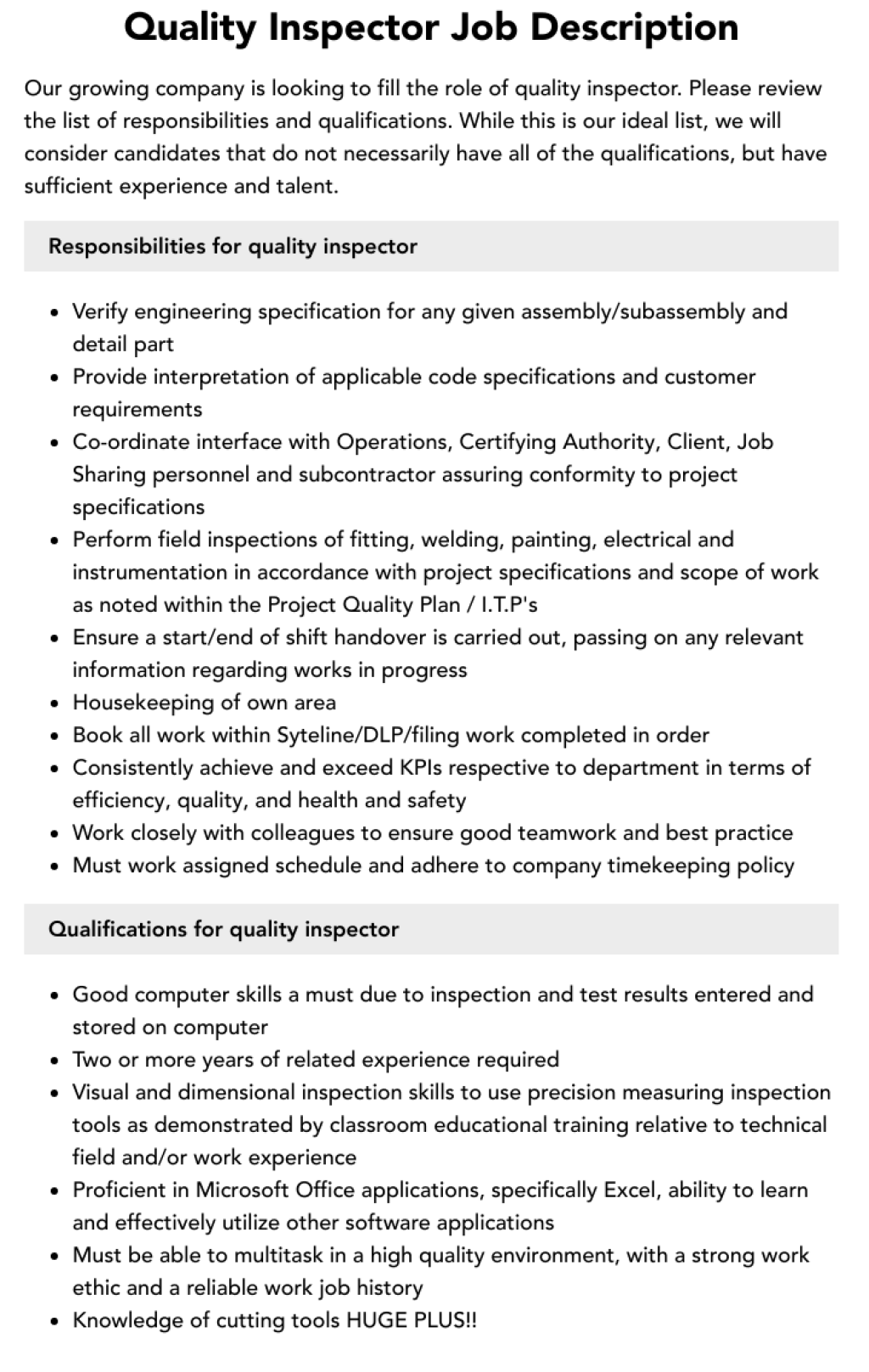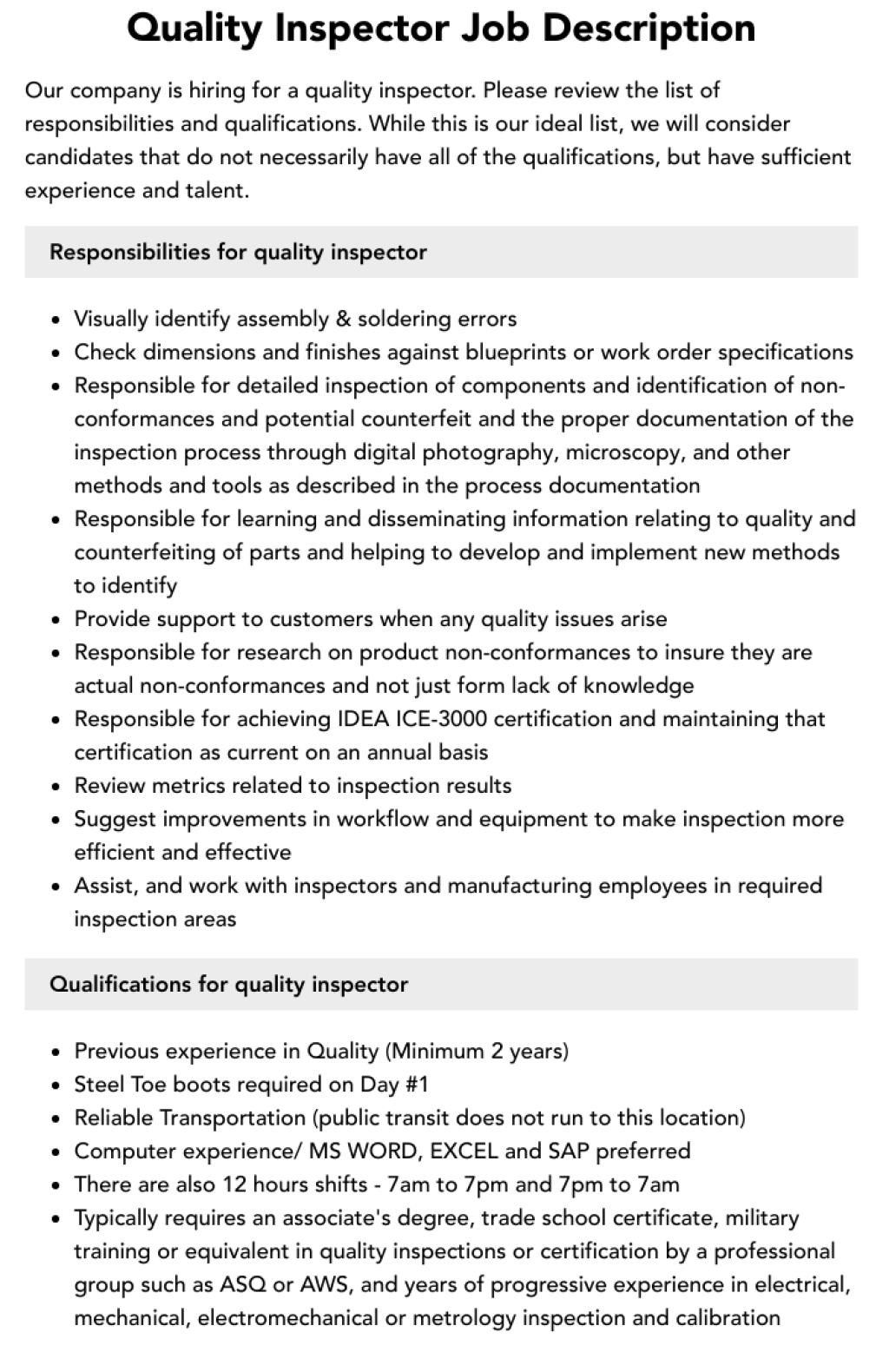Unlock Your Career: Electronics Quality Inspector Job Description – Discover And Apply Now!
Electronics Quality Inspector Job Description
Introduction
Hello Readers,
3 Picture Gallery: Unlock Your Career: Electronics Quality Inspector Job Description – Discover And Apply Now!



Welcome to this comprehensive article on the job description of an electronics quality inspector. In today’s technologically advanced world, the demand for electronic products is constantly increasing. As a result, the role of a quality inspector in the electronics industry has become crucial. In this article, we will explore what an electronics quality inspector does, the qualifications required for this role, the advantages and disadvantages of pursuing a career in this field, and much more. So, let’s dive in and discover the ins and outs of being an electronics quality inspector!
What is an Electronics Quality Inspector?

Image Source: velvetjobs.com
🔎 An electronics quality inspector is responsible for ensuring that electronic products meet the required quality standards before they are released into the market. They play a vital role in the manufacturing process by conducting inspections and tests to identify any defects or malfunctions in the products. These professionals work closely with engineers and production teams to ensure that all quality control measures are adhered to.
Job Responsibilities
A typical electronics quality inspector performs the following tasks:
Conducting visual inspections of electronic components and finished products to detect any defects or deviations from quality standards.
Performing various tests, such as functional tests and performance tests, to ensure the proper functioning of electronic devices.
Identifying and documenting any non-conformities or quality issues, and recommending corrective actions to address them.
Collaborating with engineers and production teams to develop and implement quality control procedures and guidelines.
Maintaining accurate records of inspection results, test data, and other quality-related documents.
Participating in the root cause analysis of quality issues and assisting in the implementation of preventive measures.
Keeping up-to-date with industry standards and trends in electronics manufacturing to enhance the quality inspection processes.
Who Can Become an Electronics Quality Inspector?

Image Source: velvetjobs.com
📚 To become an electronics quality inspector, certain qualifications and skills are required. While the specific requirements may vary depending on the employer and the complexity of the products being inspected, here are some general prerequisites:
Education and Training
Most employers prefer candidates with a bachelor’s degree in electrical engineering, electronics, or a related field. A solid educational background provides a strong foundation in electronics and helps inspectors understand the intricacies of the products they will be inspecting. Additionally, specialized training programs or certifications in quality control and inspection techniques can also be beneficial for this role.
Technical Knowledge

Image Source: velvetjobs.com
Having a deep understanding of electronic components, circuits, and systems is essential for an electronics quality inspector. They should possess knowledge of industry standards, such as ISO 9001, and be familiar with quality control tools and methodologies. Proficiency in using testing equipment, such as oscilloscopes and multimeters, is also crucial.
Attention to Detail
Attention to detail is a key attribute for an electronics quality inspector. They must have the ability to spot even the smallest defects or deviations from quality standards. This keen eye for detail ensures that only products of the highest quality are released into the market.
Analytical Skills
Analytical skills are essential for analyzing test data, identifying trends, and making informed decisions. Electronics quality inspectors should be able to interpret complex technical information and effectively communicate their findings to relevant stakeholders.
Communication Skills
Effective communication is crucial for an electronics quality inspector to collaborate with engineers, production teams, and other stakeholders. They should be able to clearly convey their observations, recommendations, and any quality issues to ensure a smooth workflow.
Problem-Solving Abilities
Electronics quality inspectors often encounter challenges and must be able to think critically and solve problems efficiently. They should have a proactive approach to identify root causes of quality issues and contribute to implementing effective solutions.
When and Where to Work as an Electronics Quality Inspector?
⌚ Electronics quality inspectors can work in various industries, including consumer electronics, automotive, aerospace, medical devices, telecommunications, and more. The demand for their skills and expertise exists across the globe, offering ample opportunities for employment. They may be employed by electronics manufacturing companies, quality control departments, or even work as independent consultants.
Why Choose a Career as an Electronics Quality Inspector?
💼 Choosing a career as an electronics quality inspector can be rewarding for several reasons:
Job Security
The electronics industry is continuously growing, and there will always be a need for quality inspectors to ensure the integrity of electronic products. This provides job security and stability in the field.
Opportunities for Growth
As an electronics quality inspector gains experience and expertise, there are ample opportunities for career growth. They can progress to supervisory or managerial roles, lead quality improvement initiatives, or even move into related fields such as quality engineering or management.
Contribution to Quality Assurance
By ensuring that only high-quality products reach the market, electronics quality inspectors play a vital role in enhancing customer satisfaction and maintaining a positive brand reputation for the companies they work for.
Continuous Learning
In the dynamic field of electronics, there is always something new to learn. Electronics quality inspectors have the opportunity to stay updated with the latest technological advancements and industry best practices, keeping their knowledge and skills relevant.
Global Impact
Quality inspectors contribute to the global economy by upholding quality standards and ensuring the safety and reliability of electronic devices used worldwide. Their work plays a significant role in maintaining quality control throughout the global supply chain.
How to Become an Electronics Quality Inspector?
🎓 To become an electronics quality inspector, follow these steps:
Educational Pathway
Obtain a bachelor’s degree in electrical engineering, electronics, or a related field. This will provide a solid foundation in electronics and the necessary knowledge to excel in this role.
Gain Experience
Seek internships or entry-level positions in electronics manufacturing companies to gain hands-on experience and familiarize yourself with industry standards and quality control processes.
Specialize in Quality Control
Consider pursuing specialized training programs or certifications in quality control and inspection techniques. This will enhance your technical skills and increase your employability.
Continuously Learn and Improve
Stay updated with the latest developments in the electronics industry, quality control methodologies, and relevant regulations. Continuously enhance your knowledge and skills to become a valuable asset in the field.
Network
Build a professional network by attending industry events, joining relevant associations, and connecting with professionals in the field. Networking can open doors to new opportunities and provide valuable insights.
Apply for Positions
Once you have the necessary qualifications and experience, start applying for electronics quality inspector positions. Tailor your resume and cover letter to highlight relevant skills and experiences that make you a strong candidate.
Advantages and Disadvantages of Being an Electronics Quality Inspector
✅ Here are some advantages and disadvantages of pursuing a career as an electronics quality inspector:
Advantages
Job security in a growing industry.
Opportunities for career growth and advancement.
Contribution to maintaining product quality and customer satisfaction.
Continuous learning and staying updated with industry trends.
Global impact by upholding quality standards.
Disadvantages
The job may require attention to repetitive tasks.
Working under strict deadlines and pressure to meet quality standards.
Dealing with potential conflicts between different stakeholders.
Continuous learning to keep up with evolving technologies and standards.
Potential exposure to health and safety risks in electronics manufacturing environments.
Frequently Asked Questions (FAQ)
1. What is the average salary of an electronics quality inspector?
The salary of an electronics quality inspector can vary depending on factors such as experience, location, and the industry. On average, an electronics quality inspector can earn between $40,000 and $60,000 per year.
2. Is a degree in electrical engineering necessary to become an electronics quality inspector?
While a degree in electrical engineering or electronics is preferred, it is not always mandatory. Some employers may consider candidates with relevant experience and certifications in quality control.
3. What are the common challenges faced by electronics quality inspectors?
Common challenges faced by electronics quality inspectors include identifying hidden defects, dealing with non-conformities, and ensuring compliance with quality standards amidst tight production schedules.
4. Are there any specific certifications for electronics quality inspectors?
Yes, there are several certifications that can enhance the credibility and marketability of electronics quality inspectors. Examples include Certified Quality Inspector (CQI) and Six Sigma Green Belt.
5. Can electronics quality inspectors work remotely?
In some cases, electronics quality inspectors may have the option to work remotely, especially for tasks that can be performed through online platforms or remote monitoring systems. However, physical inspections and tests may still require on-site presence.
Conclusion
🎯 In conclusion, being an electronics quality inspector is a crucial and rewarding role in the electronics industry. These professionals ensure that electronic products meet the required quality standards, contributing to customer satisfaction and maintaining brand reputation. While the job requires attention to detail and continuous learning, it offers job security, opportunities for growth, and a global impact. If you have a passion for electronics and ensuring the highest level of quality, a career as an electronics quality inspector may be the perfect fit for you. Take the necessary steps to gain the required qualifications and embark on this fulfilling career path!
Final Remarks
Disclaimer: The information provided in this article is for informational purposes only. The job description, qualifications, and other details may vary depending on the employer and industry. It is advisable to conduct further research and consult with professionals in the field for the most up-to-date and accurate information.
This post topic: Electronics

